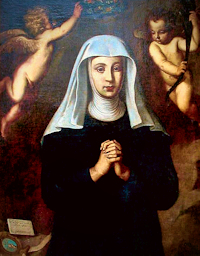Ordinary Time: February 13th
Friday of the Fifth Week of Ordinary Time
Other Commemorations: Bl. Christine of Spoleto (RM)
» Enjoy our Liturgical Seasons series of e-books!
"Then looking up to heaven he sighed; and he said to him, 'Ephatha,' that is, 'Be opened.' And his ears were opened, and the ligament of his tongue was loosened and he spoke clearly." (Mk 7:34) Christ is the Divine Physician of bodies and of souls. He instituted the Church, the Mass, and the Sacraments to procure the health of the soul. The soul is healed by keeping the commandments, by mortifying the evil impulses of the heart and by cooperating with God's graces. The soul must be healed from within—in its sentiments, affection, desires and decisions.
Meditation on the Gospel - Mark 7:31-37
Sacred Scripture quite often shows the laying on of hands as a gesture indicating the transfer of power or blessing (cf. Gen 48:14ff; 2 Kings 5:11; Lk 13:13). Everyone knows that saliva can help sooth minor cuts. In the language of Revelation fingers symbolized powerful divine action (cf. Ex 8:19; Ps 8:4; Lk 11:20). So Jesus uses signs which suit in some way the effect he wants to achieve, though we can see from the text that the effect — the instantaneous cure of the deaf and dumb man — far exceeds the sign used.
In the miracle of the deaf and dumb man we can see a symbol of the way God acts on souls: for us to believe, God must first open our heart so we can listen to his word. Then, like the Apostles, we too can proclaim the magnalia Dei, the mighty works of God (cf. Acts 2:11). In the Church's liturgy (cf. the hymn Veni Creator) the Holy Spirit is compared to the finger of the right hand of God the Father (Digitus paternae dexterae). The Consoler produces in our souls, in the supernatural order, effects comparable to those which Christ produces in the body of the deaf and dumb man. — The Navarre Bible - St. Mark
Things to Do:
- Set aside time today for an examination of conscience: are you deaf or dumb regarding Christ? Pray for the receptive silence of soul necessary to hear His will for you, and the courage to speak of His goodness and mercy to others. Are you deaf or dumb in other areas of your life? Do you listen to your loved ones and counsel them when necessary? Do you speak for those who have no voice to defend themselves, such as the unborn and elderly? Organize a group to pray the rosary outside of a local abortion clinic, donate some items to a crisis pregnancy center, or simply call a friend or relative with whom you haven't spoken in a while.
Bl. Christine of Spoleto
Blessed Christine suffered great losses early in life, causing her to reconsider seriously the goals and ambitions she had previously considered essential.Trials brought her to a deeper level of faith in God, renewed dedication to the Church, and generous service to others. She found in Augustinian spirituality a reliable guide and support in living the Christian life, while remaining a laywoman fully engaged in the world
Agostina Camozzi was the daughter of a well-known doctor in Ostenso in the Italian province of Como. A graceful and attractive young woman, she married at an early age but within a short time was left widowed. In a second relationship she suffered the loss of her only child, a son. A subsequent marriage left her widowed again, this time at the hands of a jealous rival. In about 1450 Agostina underwent a serious conversion, became an Augustinian Tertiary, and changed her name to that of Christine.
Her life now was to be one of penance, prayer, and the works of mercy. She lived in various Augustinian convents, moving from one to another, in order to remain in obscurity as best she could. In 1457 she undertook a pilgrimage with the intention of visiting Assisi, Rome and Jerusalem. Together with another tertiary she arrived in Spoleto in the province of Perugia where she devoted herself to the care of the sick and where she died on February 13, 1458, not yet 30 years of age.
Her body was interred in the Church of Saint Nicholas in Spoleto, which at the time belonged to the Augustinians. Her reputation as a woman of holiness and a worker of numerous miracles caused devotion to Christine to spread quickly and widely. Gregory XVI confirmed her cult in 1834, proclaiming her blessed.
—Excerpted from the Augustinian WebsitePatronage: Calvisano, Italy
Highlights and Things to Do:
- Read more about Bl. Christina:
- Bl. Christina's relics are located in church of Saint Gregory the Great in Spoleto, in the Umbrian region of Italy.
- There is an academic reading of the study of Blessed Christina's mummy. Her body was preserved artificially. See Idle Speculations for a short summary.






